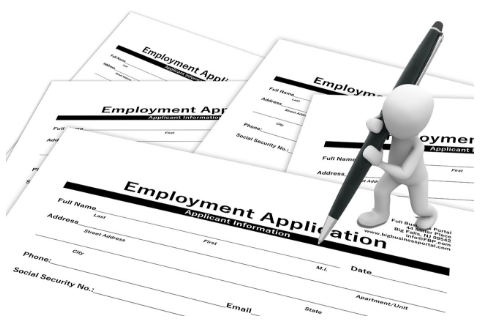Applying for and succeeding in getting the job that you want can seem like an unscalable mountain at times. After all, it’s a competitive world, and there are always others out that are applying for the same things as you. Sadly, to make matters worse, there are also some things in particular that you can do that will easily and quickly ruin your chances of being considered for the role you are applying for. Read on to find out what they are, so you can make sure they don’t hold your career prospects back.

Poor resumes
Ask any HR manager for horror stories about awful resumes and they will have at ten that will make you laugh out loud. In fact, the bad resume is something of an epidemic in the US. I’m not sure why this is because there is loads of advice on how to construct a modern a succinct resume online, as well as the info provided by schools and colleges across the land.

However, it obviously bears repeating here, so remember that resumes, above anything else need to be clear, meaning size 9 font in a swirly script is always a bad idea.
Another bad idea is a bright and funky design, so unless you are a graphic designer keep the colors professional and muted if you use any color at all. Also about spelling and grammar, it’s probably best to check this before you email your resume off to a potential employer, as it doesn’t make a good first impression if it’s riddled with mistakes. Oh, and on the subject of mistakes if you have to attach your resume as a Pdf make sure you pick the right one, and its name something appropriate!
Now, on to the structure and content of your resume. Remember that you have a maximum of two sheets to impress a potential employer and as such what you include should be precisely relevant to what they are looking for. Hint: They don’t care if you learned to ride a bike when you were 4, about the five years of tap you did as a teenager, or that your interests include reading and eating in restaurants.
Instead, fill up this space with information that you can directly relate to the job specification they have provided you with. Also, don’t be afraid to list your achievements. If you saved a previous company money and would be expected to do similar in the role you are applying for, include it. The same goes for any increase in productivity or positive results your hard work has contributed to.
Lastly, many modern resumes also include an easy to read summary of the skills that the applicant possesses. This is a great thing to lead with as it immediately grabs the HR professional’s attention and marks you out as someone that would be well suited for the role. Something that means they are much more likely to go on and read the rest of your resume, which should, in turn, help you to secure that all-important interview.
Poor cover letters
Letter writing seems to be something of a forgotten art these days, and cover letter writing, doubly so. Sadly, a great resume and poor cover letter combination can still result in you ending up on the no pile.
With that in mind, there are a few specific cover letter mistakes that it will be worth your while to avoid. In particular, don’t try and be too formal and use overly flowery language that you have had to look up in a thesaurus. It just makes you sound a bit awkward and like you don’t know the context of the word you are using.
Next, and at the opposite end of the spectrum text and messenger speak is also out. This is way too informal for any letter or even cover email, so make sure you use full words and leave the abbreviations on your phone, where they belong.
Lastly, unless you are going for a mighty grand position, you cover letter don’t have to be long. In fact, it’s totally fine for it to be around a page at font size 12. Remember it’s not a mini-autobiography, in fact, a cover letter is designed for you to be able to point to the features that best match the ones the employer is looking for, as well as convince of them of your professional capabilities and interest in the role.
Time out of work
One issue that can make a lot of employers think twice about granting you an interview is if you have a long break on your resume. This is an issue because it suggests either that you weren’t able to get a job, or you weren’t able to work due to illness, both issues that can (rightly or wrongly) create a poor impression.
However, by pulling out the positive factors of the time in between jobs you stand a better chance of being appealing to potential employers. For example, you may show that while you weren’t in formal employment, you were studying for an additional qualification, volunteering for charity, or in a sector that is relevant to the post you are applying for.

Traveling has also become a frequently more acceptable thing to list on a resume. Something that means you can be honest about this and the things you learn such as self-reliance and organization while you were off seeing the world.
Bad references
Urgh, nobody wants a bad reference, and they can interfere with the chance of you and a job you want. However, sometimes it can be tough even to work out if you are being given a less than favorable review from your old employer.
The signs to look out for include when you get to the end stage of an interview but then the process goes cold without any reason. Also, if you are offered work conditionally depending on your references and then the position is withdrawn it is a good bet that your ex-employer isn’t being too complimentary about you when asked.
It is worth bearing in mind though, that references can be something of a tricky area for previous employers. This because they are required to be honest, but previous employees can sue if they are found to be defamatory.

What this means is that it is much more likely that a reference confirming work duration and experience will be provided rather than an in-depth character review. Although, if an old employer does provide the latter and it goes beyond the factual to value judgments about you as a person, it is advisable to take legal action via a ‘cease and desist’ letter. You can even take them to a tribunal, if appropriate, as it is something that can seriously affect your work prospects in the long run.
Lacking qualifications
Qualifications are a big deal in the employment sector for two reasons. The first is that some jobs you cannot do without the right level of qualification. For example, you can’t be a college lecturer without an undergraduate and postgraduate degree, and you can’t be a medical doctor without an MD. It’s just not something that happens.

What this means is that if you have a clear idea of where you want to end up in your career you need to get on the correct education path as soon as possible.
For many, this starts in high school, as well as getting the rights grades to grant access to the right college courses that can help to start a career. This is something you can find out more about here, as they provide information about the choices you need to make early in that will help you achieve the correct progression.
However, this is not the only value that getting the right qualifications have regarding your career. There are more professional development qualifications and basic skills areas that can also be useful to hold, such as a CPR certification, a management certificate, or a membership to a professional body. These are often not mandatory, but they do give you a leg up in the application process for the job you want.
This reason for this is because they help to make you stand out as a stronger candidate than the rest, as well as demonstrating your commitment and focus on the career path you have chosen. Something that makes such courses a worthwhile activity to pursue when you are looking to improve your employment prospects.
Too few applications
Back in school a teacher once said to me that for every 100 applications you send out, you can expect to get back about three responses.
Now, this sounds pretty depressing, but it is the reality of the job market. That means it vital not to get discouraged and stop applying if you hear nothing back.

Keep going, and eventually, even if you don’t get granted an interview someone will point out the reason why, and this can be used to feedback into your application process. Then you will have a much better chance of getting an interview for the post you want going forward, and that is why you shouldn’t let too few applications and responses interfere with your employment prospects as a whole.








